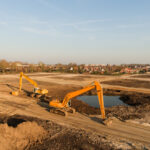The steel and iron ore industry is a cornerstone of modern infrastructure, providing the raw materials for countless construction projects and manufacturing processes worldwide. With a strong demand for steel and iron ore, the industry offers a range of lucrative job opportunities for individuals with various skill sets and expertise. In this article, we will explore the top-paying jobs in the steel and iron ore business, shedding light on the roles and responsibilities of each, as well as the corresponding average annual salaries.

- Mine Supervisor
Average Annual Salary: $45,000
The role of a mine supervisor is critical in ensuring the efficient and safe extraction of iron ore. Mine supervisors are responsible for overseeing mining and quarrying operations and managing the workforce. Their duties encompass everything from coordinating extraction processes to ensuring the safety and well-being of mining personnel. The job often requires a combination of technical knowledge and leadership skills, making it a stepping stone for career growth within the industry.
Key Responsibilities:
- Supervising mining and quarrying operations.
- Ensuring safety protocols are followed.
- Managing and leading a team of miners and quarry workers.
- Metallurgical Engineers
Average Annual Salary: $83,000
Metallurgical engineers play a crucial role in the steel and iron ore industry by overseeing the processing of mined minerals into the finished products that are essential for various applications. They are responsible for optimizing the extraction and refining processes to ensure high-quality final products. These engineers are involved in the entire production cycle, from ore extraction to the creation of usable steel products.
Key Responsibilities:
- Overseeing mineral processing and refining operations.
- Ensuring quality control and product consistency.
- Optimizing extraction and processing methods.
- Senior Field Engineer
Average Annual Salary: $99,000
Senior field engineers are at the forefront of the steel and iron ore industry, managing all aspects of field operations. They are involved in the planning, execution, and delivery of mining projects, from initial stages to completion. These professionals collaborate with other field engineers and work on complex projects that require leadership and technical expertise.
Key Responsibilities:
- Planning and executing mining operations in the field.
- Collaborating with a team of field engineers.
- Ensuring project delivery and quality control.
- Structural Engineer
Average Annual Salary: $83,000
Structural engineers are essential to the steel and iron ore industry, as they ensure the integrity and safety of structures within mining and processing facilities. This role requires a strong educational background, typically with at least a bachelor’s degree in engineering. Structural engineers use various software programs and structural drawing tools to test 3D models and perform other essential tasks to maintain the stability and strength of mining infrastructure.
Key Responsibilities:
- Designing and analyzing mining infrastructure.
- Testing and evaluating 3D models for structural integrity.
- Implementing safety measures and risk assessments.
- Mining Geologist
Average Annual Salary: N/A
Mining geologists have a multifaceted role that goes beyond evaluating the quality of iron ore production. They are responsible for assessing the impact of mining operations on the local environment and developing strategies to minimize adverse effects. This position is integral to the industry’s sustainability efforts and ensuring the responsible extraction of natural resources.
Key Responsibilities:
- Evaluating the quality of iron ore.
- Monitoring and mitigating environmental impact.
- Recommending sustainable mining practices.
High Demand and Lucrative Prospects
The steel and iron ore industry is marked by high demand and consistent growth, which translates into lucrative job opportunities across various domains. The roles mentioned above showcase the diverse skill sets needed to keep the industry running efficiently and sustainably. In addition to attractive salaries, these jobs often come with opportunities for career advancement and professional development.
Challenges and Opportunities in the Industry
While the steel and iron ore industry offers high-paying jobs, it is not without its challenges. Here are some key factors that individuals interested in these roles should consider:
- Safety and Environmental Concerns: Safety and environmental regulations are paramount in the mining and processing of iron ore. Professionals in these roles must be diligent in adhering to safety protocols and adopting eco-friendly practices to minimize the industry’s impact on the environment.
- Technological Advancements: The steel and iron ore industry is evolving with advancements in technology. Professionals must stay updated on the latest equipment, software, and techniques to remain competitive in the job market.
- Global Market Dynamics: The industry is influenced by global market dynamics, which can affect job stability. Being aware of market trends and economic factors is essential for professionals to make informed decisions in their careers.
- Education and Training: Many of the top-paying roles in the industry require specialized education and training. Prospective professionals should be prepared to invest time and effort in gaining the necessary qualifications.
Additional Considerations
In addition to the roles highlighted above, there are several other high-paying positions in the steel and iron ore industry, each with its unique set of responsibilities and salary packages. Some of these positions include:
- Materials Scientists: These professionals focus on developing and testing materials for use in various applications, including steel production. They ensure that materials meet specific performance requirements and quality standards.
- Mining Operations Managers: These individuals oversee all aspects of mining operations, including production, safety, and cost management. They are responsible for ensuring that mining projects are executed efficiently and profitably.
- Environmental Compliance Specialists: These specialists play a crucial role in ensuring that mining and processing operations comply with environmental regulations. They work to minimize the environmental impact of mining activities.
- Maintenance Managers: Maintenance managers are responsible for the upkeep and repair of mining equipment and infrastructure. They play a vital role in preventing downtime and ensuring the reliability of mining operations.
Conclusion
The steel and iron ore industry offers a range of high-paying job opportunities, reflecting the critical role this sector plays in the global economy. From mine supervisors who oversee extraction operations to metallurgical engineers who transform raw materials into finished products, these positions are essential for the industry’s success.
While the industry presents significant earning potential, it also comes with responsibilities related to safety, sustainability, and technological advancements. Staying informed about market dynamics and investing in education and training are crucial for those seeking to establish a successful and rewarding career in the steel and iron ore business. As the demand for steel and iron ore continues to grow, these high-paying jobs are likely to remain in high demand, making them attractive prospects for individuals seeking financial stability and professional growth in their careers.
In an ever-evolving global economy, the steel and iron ore industry stands as a pillar of strength, offering opportunities for both seasoned professionals and those just beginning their careers to contribute to vital infrastructure projects and advancements in technology. With the right qualifications and commitment to safety and sustainability, these high-paying jobs can provide a stable and rewarding future in an industry that shows no signs of slowing down.





